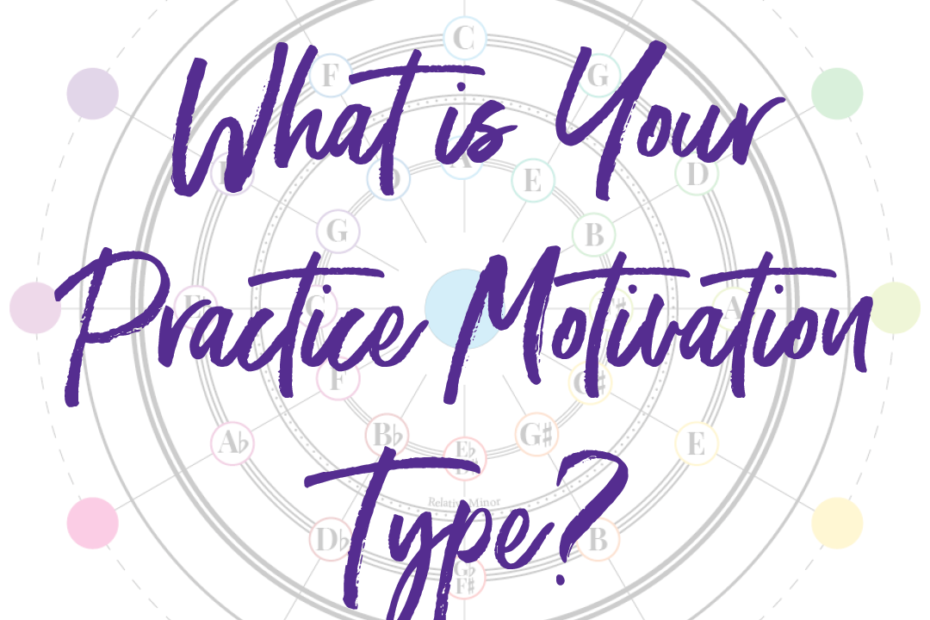Is your practice feeling stuck?
Do you feel like you’ve tried EVERYTHING but your motivation sits at zero and it just won’t budge?
Sick and tired of feeling guilty because another day went by and you didn’t practice?
If your daily practice feels like a battle with no survivors…
You probably aren’t using your motivation type to your advantage!

If you haven’t taken the quiz yet, CLICK HERE!
If you took the quiz and learned which practice motivation type you have, keep reading below for the Motivation Profiles of each type!
As musicians, our practice can be motivated by two kinds of expectations:
1. Inner expectations: Expectations we have for ourselves. For example:
- You expect yourself to practice [number] of days each week
- You want to practice [number] of minutes or hours each day
- You choose to practice certain kinds of exercises (scales, arpeggios, intervals, etudes, etc.)
- You want to play and master particular music and repertoire
2. Outer expectations: Expectations others have for us. For example:
- Directors expect us to have ensemble music prepared
- Our peers expect us to be prepared and reliable in rehearsals
- Our lesson instructors expect us to practice lesson material or practice in a way they recommend. (i.e. they might recommend practicing 5 days a week or practicing at least 1 hour daily)
Teamwork Tchaikovsky Motivation Profile
As a Teamwork Tchaikovsky, you use outer expectations to achieve your own inner expectations. This means that you are probably successful at meeting the needs of others, but might struggle when you want to meet your own practice goals. Teamwork Tchaikovsky’s often ask, “What must I practice today?”
Even though it can be difficult to meet your personal practice goals, this does NOT mean you are lazy, a people-pleaser, or that you lack willpower. It means that you need accountability to feel motivated to act. You are in good company, because Teamwork Tchaikovsky’s are the most common motivation type! Other Tchaikovsky’s just like you use outer accountability in creative ways to achieve their inner music goals.
Your Strengths
Reliability – As a Teamwork Tchaikovsky, you are the most dependable of the four Motivation Types. Your dedication to helping others means you are probably a highly valued member of your ensembles and community.
Possible Weaknesses
Difficulty Saying “No” and Burnout – Because you are highly motivated by outer expectations, you might have difficulty saying no when you have too much on your plate already. If this continues for too long, you can burn out and rebel against what is expected of you.
Would you like a motivation type name that highlights a minority composer? Check out Shirley J. Thompson‘s music and become a Teamwork Thompson instead!
Are you a Teamwork Tchaikovsky who wants an in-depth guide to practice motivation with 30+ type-specific practice tips?
Get the Teamwork Tchaikovsky’s Guide to Practice Motivation here!
Inquisitive Ibert Motivation Profile
As an Inquisitive Ibert, you are motivated by inner expectations but resist outer expectations. This means that you are probably successful at achieving your personal practice goals! However, you might struggle when others ask you to practice something you feel is unnecessary or pointless. In particular, you probably do not react well when someone tells you “Do this because I said so.” You want to know why you should bother!
Inquisitive Ibert’s often ask, “Why should I spend my time practicing this or practicing this way?” For example, Inquisitive Ibert’s need to know the reason why a teacher is asking them to practice a certain way before they feel motivated to act on their advice.
Your Strengths
Logical and Self-Motivated – You practice with a strong sense of purpose and have solid reasons behind your practice choices. You are willing to research the most useful exercises and strive to understand why they are helpful to you.
Possible Weaknesses
Appearing Disrespectful – Because Inquisitive Ibert’s ask so many questions, teachers and ensemble directors can see them as argumentative or confrontational. In reality, they are just trying to understand why an outer expectation is worth their attention and effort.
Would you like a motivation type name that highlights a minority composer? Check out Adina Izarra’s music and become an Inquisitive Izarra instead!
Are you an Inquisitive Ibert who wants an in-depth guide to practice motivation with 30+ type-specific practice tips?
Get the Inquisitive Ibert’s Guide to Practice Motivation here!
Motivated Mahler Motivation Profile
As a Motivated Mahler, you are motivated by both types of expectations, instead of one (or none) of the expectation types. This means that you are probably successful at achieving your practice goals because you are self-directed and driven. Others know they can rely on you, and you know that you can rely on yourself.
Even though being a Motivated Mahler means you probably have little trouble motivating yourself to practice, you can struggle to feel motivated without clear expectations from yourself and others.
Your Strengths
Habits and Organization – You are likely able to form helpful practice habits more easily than the other Motivation Types. You might also excel at time management and organizing your music goals.
Possible Weaknesses
Inflexibility – You might struggle to quickly adapt your practice routine or material to new repertoire or expectations. Or, your practice routine might be in need of an update because you continue to stick to a practice routine you have outgrown.
Motivated Mahlers and Teamwork Tchaikovskys are both motivated to meet outer expectations, so if you feel this description does not fit you, you might be a Teamwork Tchaikovsky! The key question is: Do you struggle to meet your inner expectations? If yes, then you are probably a Teamwork Tchaikovsky (see the first profile above).
Would you like a motivation type name that highlights a minority composer? Check out Thea Musgrave‘s music and become a Motivated Musgrave instead!
Are you a Motivated Mahler who wants an in-depth guide to practice motivation with 30+ type-specific practice tips?
Get the Motivated Mahler’s Guide to Practice Motivation here!
Rogue Rachmaninoff Motivation Profile
As a Rogue Rachmaninoff, you resist both kinds of expectations (instead of being motivated by one or two types of expectations). Yours is the rarest motivation type and it often means that you value the freedom to make your own decisions. Resisting both inner and outer expectations can make motivation difficult, but it is still very possible to motivate yourself as a Rogue Rachmaninoff.
Instead of feeling motivated by expectations, Rogue Rachmaninoff’s prefer to defy expectations. You probably respond well to challenges and enjoy proving others wrong. However, when someone gives you directions or instructions, you may feel resistant and resentful even if it was something you wanted before the directions. As a Rogue Rachmaninoff, your lack of motivation can sometimes be mistaken for laziness. This motivation type does not mean you are lazy, though. Rogue Rachmaninoff’s are often expressive, creative, and passionate musicians.
Your Strengths
Individuality – Rogue Rachmaninoff’s march to the beat of their own drum. They do not conform to traditions or conventions, which can lead them to create innovative solutions to practice problems.
Possible Weaknesses
Inconsistency – As a Rogue Rachmaninoff, you feel the most motivated to practice when you are free to practice when and how you choose. This means that it can be more difficult to form practice habits, which you tend to resist.
Want a motivation type name that highlights a BIPOC (Black, Indigenous, and People of Color) composer? Check out Daniel Bernard Roumain and become a Rogue Roumain instead!
Are you a Rogue Rachmaninoff who wants an in-depth guide to practice motivation with 30+ type-specific practice tips?
Get the Rogue Rachmaninoff’s Guide to Practice Motivation here!
Want to unlock the full 17-page guide to motivating yourself to practice?
Hack your motivation and learn how to navigate your type’s weaknesses with 30+ actionable tips you can use TODAY!
Maximize your practice productivity with your type’s Guide to Practice Motivation!
Included in the 17-page Comprehensive Guide to Motivation:
1. The Definition of Motivation
2. The Difference Between Motivation and Willpower
3. What Motivates Musicians
4. What Fires Up Your Practice Motivation Type (Your In-Depth, highly detailed Practice Motivation Profile!)
5. The Inner Workings of Each of the 4 Practice Motivation Types
6. How to Maximize Your Type’s 4 Core Strengths and Use Them to Your Advantage!
7. How to Become Aware of Your Type’s 4 Potential Weaknesses and Manage Them with Ease
8. How Your Secondary Motivation Type Influences Your Practice
9. Your Type’s Core Practice Pillars That Will Be the Foundation of Your Practice
BONUS: 30+ of the Best Simple and Easy-to-Use Practice Tips to Maximize your Type’s Motivation!
(Organized by each of your type’s unique practice pillars!)
